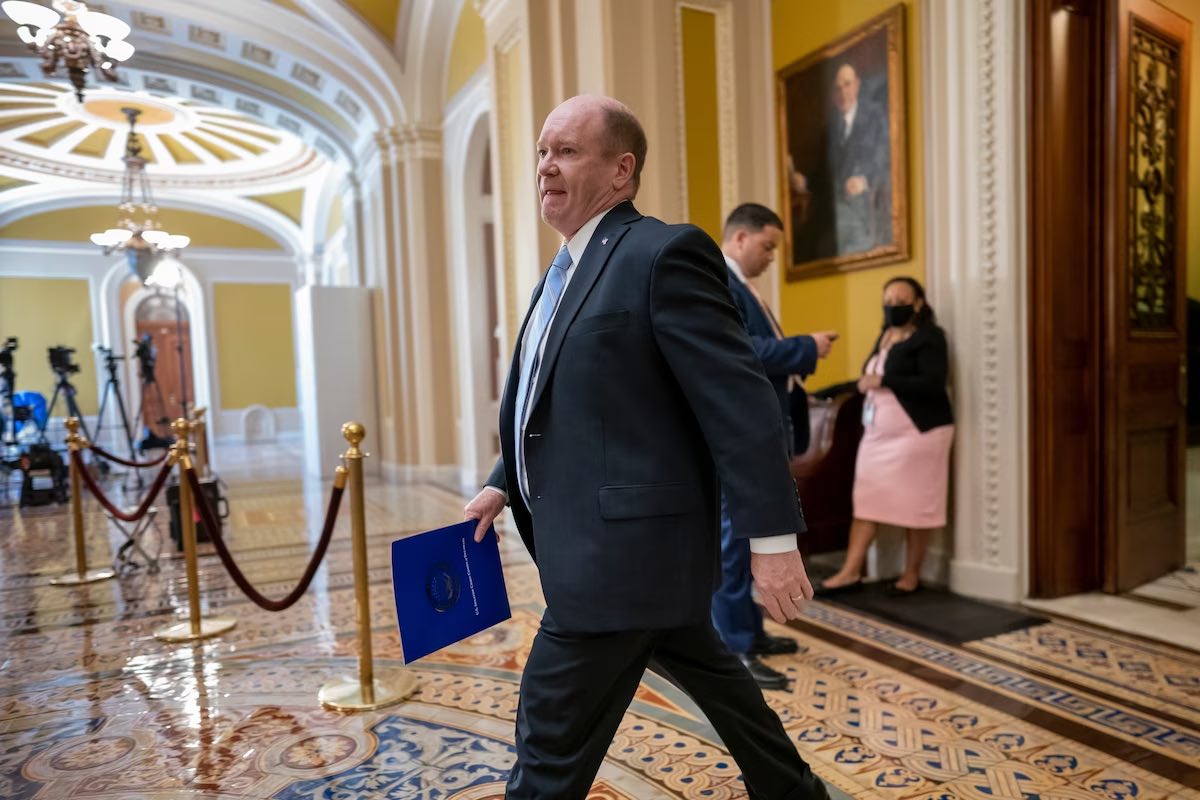Senators eye carbon border tax to combat climate change, counter China
Sens. Coons, Cramer unveil bill to lay the groundwork for a carbon border tax
In a rare example of a bipartisan climate policy, momentum is growing on Capitol Hill for a plan to tax imports from China and other countries with looser environmental standards.
Today, Sens. Christopher A. Coons (D-Del.) and Kevin Cramer (R-N.D.) will introduce a bill that would lay the groundwork for America’s first carbon border tax, according to legislative text shared first with The Washington Post. The senators’ goal is to impose fees on iron, steel and other imports from China and other countries that are not significantly reducing greenhouse gas emissions.
The bipartisan bill, dubbed the Prove It Act, would take a first step toward this goal. It would require the Energy Department to study the emissions intensity of certain products — including aluminum, cement, crude oil, fertilizer, iron, steel and plastic — produced in the United States as well as its allies and adversaries.
“Using trade to advance American manufacturing — and to disadvantage dirty or high-emissions products — is ultimately the only way we’re going to put effective pressure on China, Russia and India to dramatically reduce their emissions,” Coons said in an interview Tuesday.
Cramer said Republicans are increasingly interested in a carbon border tax as a way to counter China and protect U.S. businesses.
“China’s sort of an easy target,” Cramer said. “They are the ones producing cheap stuff. But there are other players besides China that are dirty producers taking advantage of our system.”
Co-sponsors of the new bill include two other Republicans — Sens. Lindsey O. Graham (S.C.) and Lisa Murkowski (Alaska) — as well as Sens. Sheldon Whitehouse (D-R.I.), Martin Heinrich (D-N.M.), John Hickenlooper (D-Colo.) and Angus King (I-Maine).
The measure comes after the European Union in April approved the world’s first tax on carbon-intensive imports. The decision will require importers to start paying the tax in 2026, although they will have to start accounting for the carbon emissions associated with their products in October.
The bill also comes after Democrats last year enacted the most ambitious climate bill in U.S. history. While no Republicans voted for the Inflation Reduction Act, conservatives have increasingly embraced the idea of taxing imports from foreign adversaries — an idea that meshes with former president Donald Trump’s aggressive trade policy that wielded tariffs as weapons.
“I think that Trump really had an impact on trade policy and the growing recognition that China is a major security threat to the United States,” said George David Banks, who served as a White House climate adviser under Trump. “It’s clearly driving this conversation within GOP circles.”
A ‘carbon club’
For Democrats, the conversation began in earnest after the passage of the Inflation Reduction Act, which did not include a carbon border tax.
The bill did, however, include green subsidies that alarmed European officials, who worried that companies could shift investments out of Europe and into North America to secure the tax breaks.
Coons said his “larger objective over the next few years” is to calm these transatlantic tensions by creating a “carbon club” — a group of allied countries that have all adopted ambitious climate laws. Such a club could include the United States, European Union, United Kingdom, Canada, Mexico, Japan, South Korea and Australia.
Still not a carbon tax
While Republicans have warmed to the idea of carbon border tariffs, they remain resistant to a domestic carbon tax, saying it would harm the U.S. fossil fuel industry.
“Republicans are largely pretty cool to the idea of a carbon tax, and I am in that camp, coming from a coal- and oil- and gas-producing state,” Cramer said.
“We spend so much time as Republicans saying hell no to people who want to tax carbon or want to somehow decarbonize,” he added. “But the whole ‘America First’ movement and agenda is a comfortable place for Republicans. So this is the low-hanging fruit of climate policy or trade policy or whatever you want to call it.”
You can read our full story about the growing momentum for a carbon border tax here.

